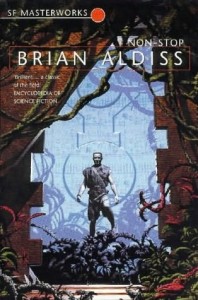 Welcome to the inaugural instalment of Dust Jacket, Nerd Culture Podcast’s biweekly review of the greatest Sci-Fi novels of all time. I’m your host, Richo. I’m joined by Luke Walker, the world’s harshest critic.
Welcome to the inaugural instalment of Dust Jacket, Nerd Culture Podcast’s biweekly review of the greatest Sci-Fi novels of all time. I’m your host, Richo. I’m joined by Luke Walker, the world’s harshest critic.
For our first review we’re turning our eye to Non-Stop, the 1958 novel by acclaimed British novelist Brian Aldiss.
The environment of Non-Stop is a Generation Ship, a starship travelling across such vast distances that whole generations will pass before it reaches its final destination. Something has plunged the ship into barbarism; the history of the vessel has been lost in time and buried in fable and metaphor, and most of the inhabitants have lost the knowledge that they’re even on a ship. The inhabitants gather in primitive tribes that roam the decks and corridors of the starship, meting out a harsh, simple existence and fending off the myriad threats that surround them.
One such inhabitant is Roy Complain, a hunter from the Greene Tribe dissatisfied with his lot in life. This dissatisfaction makes him open to manipulation by Marapper, who recruits him and several other followers on a journey to “Forwards”, the front section of the ship, where the priest believes he will find the “Control Room”, which will enable him to seize control of the ship.
A perilous journey ensues, each step revealing more of the nature, history and mystery of the generation ship. Slowly, Complain unravels the secrets of his world and those that inhabit it. Along the way he encounters mutants, scavengers, intelligent rats and giants, and even finds love in the form of Aur Vyann, an inhabitant of the more culturally advanced Forwards.
DAVID: First, my one real negative. The weakest aspect of Non-Stop becomes apparent very early on in the book; there is little character depth to Roy Complain and his companions. Aldiss has created only the most superficial of archetypes – the discontent hunter seeking answers to the mysteries of life, the power-hungry and manipulative priest, the beautiful and mysterious love interest. The relationships between the characters are equally two-dimensional, occasionally bordering on melodrama. Complain’s romance with Aur Vyann is particularly jarring at times. I found myself not really engaging with the characters on anything but the most shallow level.
LUKE: Roy is not just a discontent hunter. He feels anger and guilt when Gwenny, his wife and responsibility, is kidnapped. This leads to a sense of loss, not only within himself, but also to a missing element in the wider world, which he feels compelled to discover. Roy comes from that hearty breed of SF outsiders who, dissatisfied with the limits of their society, strive for something more. ‘What do we get out of life here?’ he asks Marapper, ‘What is the object of the world?’. These questions open him up to Marapper’s manipulations, which lead to the exploration of the rest of the ship. True, Aldiss doesn’t extend beyond the archetype, but it does give him a human basis to hook the reader and start building his world. And that’s where the real joy in the book lies…
DAVID: Unfortunately, I didn’t feel that level of character depth that you did. The characters seem to be window dressing to the driving mystery in the story; the nature and history of the starship the characters inhabit. It’s here that the real strength of Non-Stop lies. The ship is a nightmarish environment of primitive tribes, scarred mutants and intelligent killer rats with psychic animal slaves. Mutated hydroponic plants grow wildly across decks and down corridors. Giants haunt the passageways, kidnapping unsuspecting victims. The sense of menace is very real and excellently handled. There is a very real sense of confinement bordering on claustrophobia.
LUKE: The characters aren’t window dressing. Not only is Roy driven by a need to explore the ship, but also by a need to legitimise his people, to have them recognised. It’s what he discovers throughout the ship that helps him see that. And, man, what a ship it is. A far cry from the Enterprise or the Galactica, this is a place where Man has become the victim of the environment and not it’s master. Where danger cannot be outrun, just momentarily outdistanced.
DAVID: Absolutely. The Generation Ship provides the true mystery and intrigue of Non-Stop. Following the story of Roy Complain brings us the knowledge we really seek; what is the ship, where did it come from, and what disaster has led to the barbarism that now dominates the craft? Slowly, Aldiss unravels this mystery for us, with a complex series of twists and turns that give just enough information at the right times to hold our interest. Each new revelation provides a further piece of the puzzle, slowly unravelling the whole truth about this fascinating world. Non-Stop is less of a character study and more of an engrossing mystery.
LUKE: That mystery really is the heart of the book. It’s where the evolution (or de-evolution) of humanity is revealed to the reader and characters. True, it’s not a character study, but a plot driven narrative. Roy might not be memorable once the book is shut. But he and Aur Vyann get caught in some pretty interesting situations, and there is enough action to sustain interest. Aldiss’ strengths are however his ability to create atmosphere and intricate, interesting new worlds for his characters and readers to explore. You do actually feel you’re on the ship, sharing the danger. It’s also a testament to Aldiss’ accessible, almost poetic, prose style that his story is immersive.
RATINGS
DAVID: Non-Stop creates a brilliantly realised and incredibly bleak world that only suffers from occasional poor characterisation. The mystery of the starship and the sense of menace its corridors hold overcome this minor flaw, creating a compelling read. For me, the book deserves 3.5 Lukes, if for no reason than its incredible world-building and high concept ideas.
LUKE: It’s a 3.5 for me, too. Readers might have trouble remembering Roy Complain’s name once the book is finished, but there is much about Roy’s discoveries to enjoy.
WHAT DO YOU THINK?
Was I too critical of Aldiss’ characterisation, or too praising of his high concept ideas? Is Luke’s analysis of the deeper motivations behind Roy more accurate, or is he just deluding himself? Is Non-Stop deserving of its ranking of #7 on the Top 100 Scif Fi Novels of all time? Post your comments, criticisms and, most importantly, your votes! Help us compile the definitive list of Greatest Sci-Fi Masterpieces.
BEHOLD…THE FUTURE!
Well, that’s it for us this week. Join us in two weeks for our sophomore review, where we’ll be delving into Arthur C. Clarke classic 1956 novel the City and the Stars.









Great idea I have been meaning to tackle some of the classics of the genre. Can I request a review of some modern classics. Kim Stanley Robinson’s Mars Trilogy. My understanding is that this great story of the colonisation of Mars is currently being adapted for the small screen. Or maybe Peter F Hamilton’s Commonwealth Saga….
Thanks for the recommendations. I’ve heard good things about the Mars trilogy and will definitely be giving it a shot in the near future. I’m not too familiar with the Commonwealth Saga but it’s now on my list of books to track down.
I’ll definitely be tackling some of the modern classics in the coming months, including Iain M. Banks Culture series and 2010 Hugo and Nebula Award winner The Windup Girl.